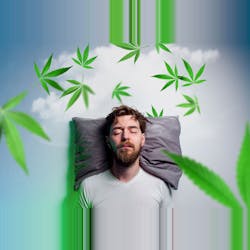Lack of hemp regulations
While CBD itself is safe for the average user, our current hemp landscape is rocky. Due diligence is necessary when shopping for CBD and other hemp products. Always check for a certificate of analysis (COA) before purchasing hemp products of any kind, even if you’re sticking to mainstream products like CBD.
The 2018 Farm Bill federally legalized hemp products for sale and possession in the United States (state laws vary), provided they contain less than 0.3% delta 9 THC by weight. However, the U.S. government has yet to establish content standards or testing requirements for hemp-derived products, including CBD. It’s up to consumers to research hemp products before they use them.
Drug interactions
Both prescription and over-the-counter medications can interact with each other and with other substances you consume. That could include foods, food supplements, or plants and plant-based compounds like cannabis-derived CBD.
Your body needs to metabolize any substance you ingest to reap its effects. Processing multiple substances at the same time can lead to wires getting crossed. That’s why doctors warn patients on blood thinners not to take aspirin (it can cause uncontrolled bleeding in the digestive tract) and advise some patients on statins to avoid eating grapefruit (they can interact and cause liver and kidney damage).
Speak to your doctor if you use any medication and would like to give CBD a try. You can also do basic research yourself on potential drug interactions.
Interplay between CBD and sleep is obviously present, but other cannabinoids may provide equal or even greater benefits.
CBN for sleep
The first cannabinoid identified and documented by chemists was CBN. It’s been known to researchers for several decades longer than CBD, but unfortunately, it has undergone significantly less inquiry—until recently, that is. This renewed interest was sparked by anecdotes about CBN and its potential effect on sleep quality.
It’s unclear whether CBN truly acts as a sedative. Still, while there has been academic contention and claims that marketing is at fault, evidence of its benefits is growing. CBN may promote better quality sleep and reduce nighttime awakenings when taken on its own, and may have an even greater effect when combined with THC.
This may inspire users to double up, taking both CBN and CBD to achieve the best possible sleep. While the technique makes sense in theory, CBD doesn’t seem to boost the effects of CBN, even when taken together before bed.
Those dealing with insomnia may want to keep an eye on CBN. Positive anecdotes seem to multiply by the day, with researchers taking note. Just don’t expect it to replace pharmaceutical sleep aids anytime soon.
THC for sleep
Whenever sedation is the goal, good old delta 9 THC one-ups CBD. THC has significant CB1 receptor affinity and is known to possess sedative qualities.
Insomnia is one of the primary motivators behind medical cannabis use. The effectiveness of THC on sleep is well-documented and actively explored by researchers, with contemporary studies showing great promise. Chemists are still working out how valuable this link is to managing symptoms of specific medical conditions.
While marijuana certainly has the potential to help users sleep better, just be aware that not everyone gets the desired effect. The effect can also be strain-dependent.
A recent retrospective study parsed symptoms, diagnoses, and sleep ratings logged by 991 individuals on a medical marijuana app. Indica varieties of marijuana were found to strike down insomnia symptoms the hardest. Both high-CBD and sativa strains had less pronounced impacts.
Returning to sleep apnea for a moment, this is another area where THC could outshine CBD. Dronabinol, a legal form of synthetic THC used to treat symptoms of HIV and chemotherapy, can be prescribed off-label as an OSA treatment. Even better, the medication has done a good enough job to inspire new research—and the early results look hopeful.
A look at how CBD affects sleep, including growing evidence that CBD can improve sleep quality and make it easier to fall asleep. Read More


